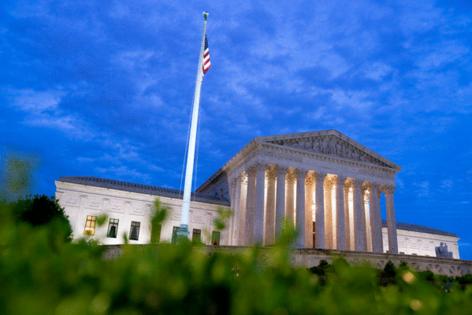U.S. Supreme Court Sounds Like it’s About to Drag Trump to the Woodshed
VANCOUVER, British Columbia — The best thing on American TV last week was the U.S. Supreme Court (SCOTUS) hearing into Trump’s tariffs. Nothing else came close. Netflix could retire its entire “Halloween horror” section and replace it with this judicial massacre.
As someone with two years left of law school, I didn't even need the degree to ascertain how royally doomed Team Trump is. A toddler would have cried just listening to the justices’ tone.
Trump’s solicitor general, D. John Sauer, came out swinging like a man possessed. Or maybe just caffeinated to the brink of cardiac arrest. Within minutes, the nine justices turned him into a verbal punching bag, landing highly selective jabs.
His argument boiled down to this: Trump needed to tariff the entire planet under emergency powers because America — the country that literally owns global commerce and prints the world’s reserve currency — was somehow being financially victimized. Also, fentanyl. Sure. Why not throw that in?
No one could possibly be buying any of this. Not even Trump, from the sound of it. “Tariffs are about making America rich again and making America great again,” Trump told Congress earlier this year. In reality, foreigners aren’t paying the tax. American businesses are forking over their own cash, then passing the bill along to American consumers.
Now SCOTUS gets to decide if Trump can legally keep this racket going. Rarely have justices side-eyed someone so hard that it could be heard through the audio alone.
Sauer tried to make the best of the legal dumpster fire he was handed, arguing that Nixon did it first. So basically, “Hey, everyone cheats on the test.” The teachers were unimpressed. Nixon, he reminded, slapped a surcharge on imports in the 1970s. Sauer then invoked the International Emergency Economic Powers Act (IEEPA) as backup for Trump’s authority.
Tiny detail, though: Congress created IEEPA precisely to prevent any future Nixon-style tariff stunts. Its legal “tools” for a presidential emergency are non-revenue measures — sanctions, embargoes, and the like. Anything that brings in cash — like tariffs or taxes — is Congress’ exclusive domain.
Trump-nominated Justice Neil Gorsuch, not exactly a progressive, sounded the MAGA alarm. If Trump’s logic stands, he suggested, what’s to stop a future president from declaring a climate emergency and tariffing every gas-powered pickup into oblivion? Once ideology masquerades as “national security,” Pandora’s box is wide open, and usually just full of invoices for everyday Americans.
The court is treating this as a constitutional separation-of-powers showdown. Congress alone delegates taxation and tariff powers to the president, if they ever choose to. Trump apparently didn’t even pretend to ask. Sure, he has other emergency tools available to him. But none of which let him commandeer the national cash register.
Trump-appointed Justice Amy Coney Barrett asked the attorney for the American businesses and states opposing the tariffs: “If you win, tell me how the reimbursement process would work. Would it be a complete mess?”
Reimbursing Americans would arguably be the least messy part of this fiasco. Far more consequential is the impact on the globalist world order. Western nations have long orbited Washington’s gravitational pull, and often to the detriment of their own citizens. This doesn't exclude American citizens, who have been stuck with the bill for U.S.-led foreign military adventures serving the narrow special interests of a select few, all under the guise of obligations to allies.
Trump’s tariffs have shaken countries like Canada awake, forcing them toward independent policies for the first time in decades. “While the United States played a predominant role on the global stage, today, that predominance is a thing of the past,” Canadian Prime Minister Mark Carney said.
He also qualified the “old relationship we had with the United States, based on deepening integration of our economies and tight security and military cooperation” as “over,” much like Canada once distanced itself from the United Kingdom.
Similarly, European leaders have referred to their “independence moment.”
“We have seen how dependencies can be used against us,” said Europe’s top bureaucrat, Ursula von der Leyen.
Sounds like they’re finally hearing Trump loud and clear. Back in 2019, at the United Nations, Trump said: “The future belongs to strong, independent nations who protect their citizens, respect their neighbors and honor the differences that make each country special and unique … Globalism exerted a religious pull over past leaders causing them to ignore their own national interests. Those days are over.”
Maybe that’s what the tariffs were really about: sending a message to allied countries acting like confused exes to “go live your best life.” Date other countries who won’t undercut your exports.
So far, they’ve started doing so. But if the tariffs are quashed, will they come running back? Or will they seize this once-in-a-generation opportunity to embrace diversity in their own sovereign interests, and re-engage with Washington on stronger and more independent footing, in a new multipolar dynamic?
Trump may be a wrecking ball on the verge of being restrained by the Supreme Court, yet he may have already ignited a reshaping of the world order that could benefit ordinary people in the long term.
































Comments